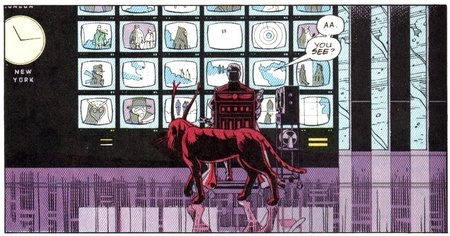Ozymandias on the history of tabbed browsing:
Observation:
Multi-screen viewing is seemingly anticipated by Burroughs’ cut-up technique. He suggested re-arranging words and images to evade rational analysis, allowing subliminal hints of the future to leak through… An impending world of exotica, glimpsed only peripherally.
Perceptually, the simultaneous input engages me like the kinetic equivalent of an abstract or impressionist painting… Phosphor-dot swirls juxtapose: meanings coalesce from semiotic chaos before reverting to incoherence. Transient and elusive, these must be grasped quickly.
This jigsaw-fragment model of tomorrow aligns itself piece by piece, specific areas necessarily obscured by indeterminacy. However, broad assumptions regarding this postulated future may be drawn. We can imagine its ambience. We can hypothesize its psychology.
In conjunction with massive forecasted technological acceleration approaching the millennium, this oblique and shifting cathode mosaic uncovers the blueprint for an era of new sensations and possibilities. An era of the conceivable made concrete…
… And of the casually miraculous.


